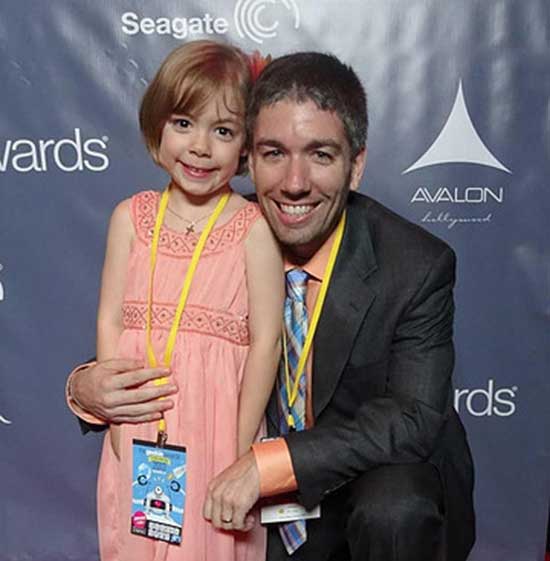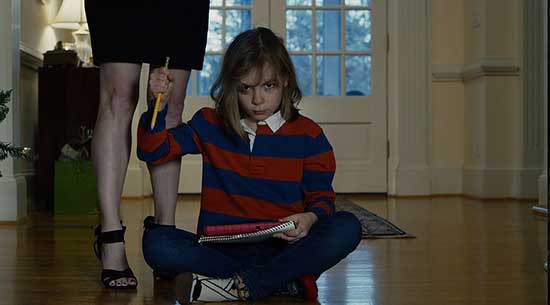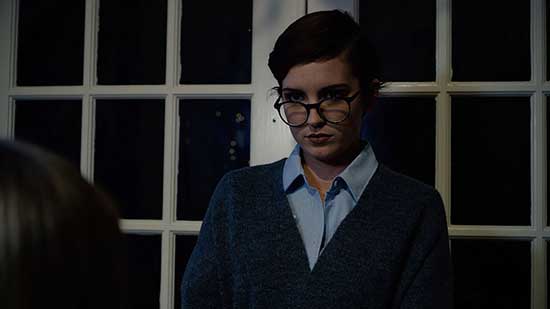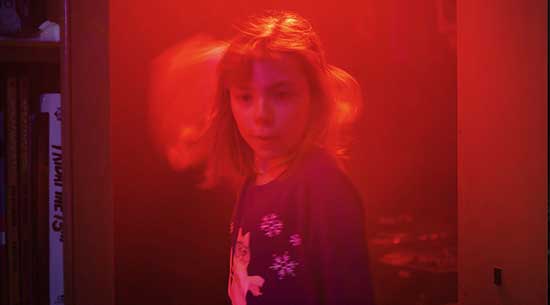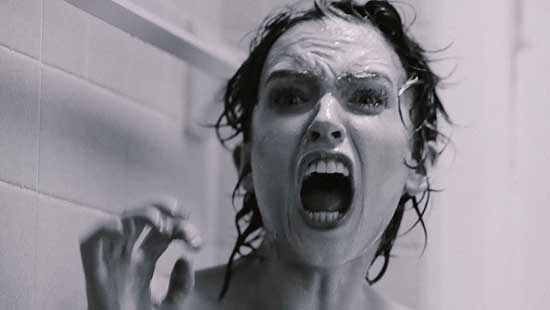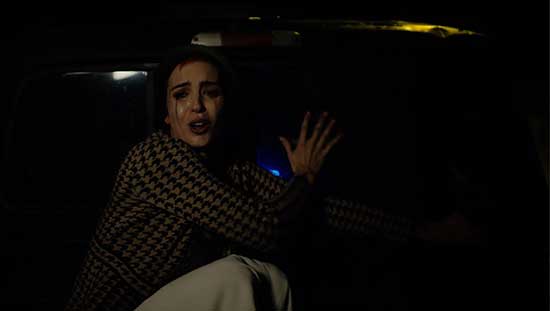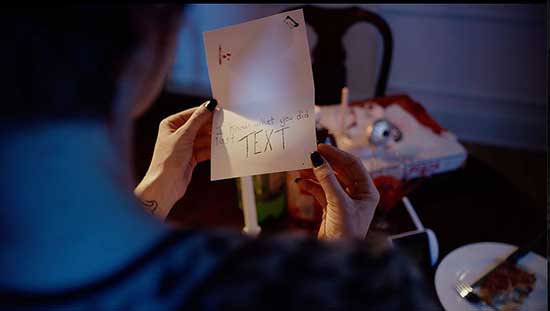Tony Reames is an award winning director, thanks to his favorite film partner (his 10 year old daughter Evan). They have worked on over 25 short films in all different genres. For their latest they chose to pay tribute to some of the best horror movies with a tale about Evan’s mortal enemy, her babysitter.
Kevin Nickelson of Horror News Net spoke with Tony about his collaborative efforts, the making of Playtime’s Over, and his unflinching love of music videos.
KN: The first thing that jumped out at me while I was doing some research online is that you seem to have an equal affinity for comedy as well as horror. Let me guess. When you were growing up, were you a fascinated by films like American Werewolf in London or going even further back?
TR: Yeah, absolutely. Its movies just like you said, like Return of the Living Dead. But my favorite growing up was a movie that my dad and I watched called Motel Hell.
KN: Yes. Rory Calhoun.
TR: Yeah. I love that movie and it goes all the way, even Friday the 13th Part 6. I’ve seen all of the classics in terms of horror, Texas Chainsaw, The Exorcist, but I don’t watch them regularly, whereas I’ll watch Friday, 13th Part 6 or Halloween 3. I’ll watch those couple of times a year. So, yeah, I definitely have an affinity for horror comedy.
KN: The funny thing is that a couple of the films you mentioned are not the same titles that a lot of other people would return for their favorite film series. You don’t hear people too often say, “I want to go back and watch Halloween 3”, right? Most people say the first film or they’ll say Halloween 4 or something like that, but you’re actually going for number three, which actually has little or nothing to do with the series itself. That is a interesting selection. Interesting set of choices that you discussed there.
TR: It goes back to growing up. I love John Carpenter, but like I said to someone just the other day; the first Halloween wouldn’t even be in my top ten of John Carpenter’s movies, but Halloween 3 would be my favorite Halloween. I think it’s more of like a touchstone thing for me when I watched it as a kid, for whatever reason. When I was a kid – I guess like most kids – I didn’t really read reviews or read the papers or anything, so I thought Maximum Overdrive was the most fun. I didn’t know that people hated it so much. There’s all these stories about it, but I loved it.
KN: Let’s go back to your childhood. Growing up, did you have someone who kind of gave you the impetus to get into film making, or were you particularly entranced by an actor, or a director?
TR: Absolutely. For me it was my father. His favorite movie of all time was Plan Nine from Outer Space, which at the time, I didn’t really know about it. He had it on VHS and we would put that thing in a dozen times a year. He would always pull out these really obscure type movies and we watched everything. He took me to see Friday the 13th Part Two in theaters. He also took me to see Nightmare on Elm Street, Part 2; I think I even saw the first one but I don’t remember it. So it wasn’t like I had this thing for actors per se, it was more about the experience.
TR: And it wasn’t always horror for me. It was more comedy. I’ve always really been into the absurd. Not your typical buddy cop things. Comedy has always been my wheelhouse. If someone says it’s a horror comedy, I’m in. I don’t care, I’ll watch it. For my birthday my dad would rent a 16 millimeter camera and then we’d go out and shoot something. We would get it processed, and then we’d splice it together. They were terrible, but that was fun, the process of it. And they were usually you’re low budget horror style, like trying to duplicate some crazy gag you’d see in some random movie. That was my childhood for sure.
KN: That sounds exactly like my childhood, except for the filmmaking. Because my dad was also a big horror fan of the Boris Karloff films, the Vincent Price films. Peter Cushing, Christopher Lee. So I got into that and he took me to my first horror film in theaters, which was Alien.
TR: Oh, wow. Yeah, I definitely did see that in theaters. That was great.
KN: I didn’t sleep for a month after that, but it was fantastic. Were you the person who took the film production classes in school? When did you start to really get the idea filmmaking is where you wanted to go?
TR: I think I’ve always known, but I always throw my mom under the bus. When I wanted to go to college that’s been my dream since I was a kid. And she said, “You can’t make money in that.” She told me I needed to get a real degree. That was her comment. I went to Pitt and realized that they had a filmmaker school called the Pittsburgh Filmmakers. I immediately befriended as many filmmakers as I could and just volunteered on any little thing. I always tell them about the time I was going to go be an extra on this Jean-Claude Van Damme movie.
TR: So we went down the Civic Arena where they were filming Sudden Death. There’s a scene in it where I get trampled by his stunt double and it’s in the trailer, and it was the first and last time I was ever going to do this. I’m definitely not going to do acting or any of that cause I got the crap kicked out of me for a day. I was all black and blue, and I thought, “Okay, let’s see if I can figure it out. Something behind the camera, and don’t get injured.” I live in Atlanta, and when I moved down here I immediately picked up the camera, and we just would go out and shoot things on the weekends, and you sort of find your film family over time, and that’s what I’ve done.
KN: Picking up the camera, and doing it, and finding your film family, that’s very interesting. One of the people that I interviewed last year is Luigi Kasi, a long time Italian horror and science fiction filmmaker. He said the best education was to go and do an actual film shoot, and to start from the very ground up as the gaffer, or the guy that goes and brings the coffee and move your way on up through the production.
KN: And his thing was that once he made it to director and had an idea for something – for how to do something – and somebody came to him and said they thought that was the wrong idea. Then he could say, with confidence, “No, this is an idea that’s going to work, and let me tell you why.” He would be drawing from his experience working those various other positions to have the confidence to be able to say, I know what I’m doing. Is that something you experienced?
TR: Absolutely. I work with a group of people and sometimes another person will write and direct a film, and I’ll assist with whatever. Do I need to do get coffee, do I need to handle catering, whatever it is and I’m there. So if I can get onset, then to me that’s a master class. That’s a game plan that I think everyone should follow. No matter where you start, if it’s a PA or whatever, an extra for anything, you’re in the game, you know what I mean?
TR: If you’re onset, you’re in the game. I feel like just being on the team will get you to whatever you’re trying to be. A lot of people I find we’ll start out, doing whatever and say, “I’m going to be an editor.” They get there and start learning other things, and may say I want to do set deck or something like that. So you’re absolutely right. The more you learn onset, the more you figure out. I’m there to learn. Just count me in.
KN: Looking at your background, you have gone the route that many a filmmaker like Russell Mulcahy, and others have done, which is you actually started out doing music videos, and then moved into short films. I actually saw the music video. Phife Dawg, that you did? Wonderfully, wonderfully done by the way. Is there a like a natural progression or a connection between doing music videos and moving into film?
TR: That’s a really good question. When I was growing up, I was into film and hip hop. Those are the two things that I that I gravitated towards. So when Yo! MTV Raps came out, there was this epiphany because I was seeing the visual representation of the music. Back then you didn’t really see them on interviews or TMZ or anything like that. There was nothing like that. You’d see them in music videos. They were live in concert. So as I was I was watching these music videos, especially as they became more cinematic, Michael Jackson’s thriller was the moment where everyone went, “Oh!” And I got it. You take cinema and you take music and you can put those together in a very visual way. Music videos share a lot in terms of the pacing and the style of a horror movie.
KN: Let’s get on to one of your films which is getting a lot of play. It’s called Playtime’s Over. I’m actually looking at it and I’m just in awe of the number of accolades that it’s gotten so far. It’s premiering at the Glasgow film Fest, and you were just picked up by the South side film Festival. looking at it official selection at Dances With films, Hollywood, California, official selection nominated for best comedy at Horrible Imaginings film festival in Santee, California. You must be kind of in a bit of shock. What’s your reaction to the reception?
TR: It’s everything you said. I thought we had done something kind of interesting and fun, and when I finished it, the first thing I said to my wife was, “I don’t know. I have no idea. This could be the best thing I’ve ever done. It could be the worst thing.” You’re so close to it. Then it started getting into these film festivals, and then I started thinking, “Okay, this is exciting, but a little scary too.” Because I don’t know what to expect out of all this. But then I really looked at like this and realized I’m just one part of it. There’s so many other people involved.I lucked out and got Todd Jacobs who wrote it.
TR: I got Haley Leery. She and I came up with the story. We met, we talked about it, and all these pieces came together. Amber was our special makeups affects person, and Kristen did all of the wardrobe; all of these pieces that you sort of put them all together and you just pray that the sum of the parts is now greater. It really did turn out that way. Looking back, the cream of the crop was, um, we finished it and it’s a whole bunch of little modules of horror films that I grew up with from my generation, and some newer ones. And my wife had a connection to Huey Lewis and the news.
TR: So I said, “Hey, you know, he did the song in American Psycho.” And I thought this might be a cool image if we, could end it with a particular song that I really liked of his. So she reached out to him and I think when he responded back and he I love it. “Go ahead, you can use it.” I thought, “Oh okay we really got a co-sign from Huey Lewis. So there must be something interesting here.” It’s just been this crazy, whirlwind of all these different things. Honest to God, it’s shocking! I’m just thankful that people actually sat through it. In this day and age, to have someone who will sit through a 10 minute short film is a lot ought to ask if anyone, so I’m just sort of overwhelmed, but at the same time I’m really happy because the team that worked on this, they all deserve this. These are world-class people. I’m excited for everybody.
KN: And the best is yet to come because you’ve also been picked up by the Death’s Parade Film Festival in San Jose, California. Talk about that for a bit. How that came about and so forth. We’re excited to see this film.
TR: I’m super excited and thrilled . I think I had a conversation with Anthony and he told me about it. The coolest part, I’ll be honest with yo is, when you sent me the laurels so far, you guys have your laurels for the Death’s Parade. That’s my favorite of any of them. I love that, a great job on that. I was looking at the site tonight and I don’t if that’s the cover of the program, but that’s awesome. I was looking at some of the films you’ve gotten. The one film that I’ve been dying to see is Artik. Jerry G Angelo and Gavin Scott are going to be down holding a panel with Kevin on stage. All right, awesome. I worked with Chase Williamson a couple of years ago and he’s one cool guy. I really liked that guy. I’m so excited for you guys, all of this sounds awesome.
KN: So talk about for a minute how the genesis of how Playtime’s Over came about. I know you addressed that. It’s kind of an homage to various films, but how did the idea originally, coalesce with you? Talk about that, and about the production of it.
TR: This would have been maybe a little over a year ago, a friend of mine, Haley, who plays Laurie the babysitter. She and I worked on two other things. I had seen a short film that she had done at the Buried Alive Film Festival, and I loved it and I knew the director. So I reached out to Joe and said, “You gotta put me in touch with Haley because she is the real deal. She’s a talent.” So we worked on a music video together and she was just fantastic. After that we thought we should really do something.
TR: I knew a guy named Todd and he’s a really good writer and we should just brainstorm on ideas. So we all met and we were sort of throwing around these ideas. Haley threw out an idea: what if it’s about a little girl, and we wanted to include my daughter Evan because she always wanted to work with her. Evan and I have done like a gazillion short films. So Haley said tishould have something to do with a babysitter. Then we started talking about these horror modules. What we could do is we should pick out specific scenes. We just came up with this chart of all of our favorite scenes from horror movies. We threw this list together and it must’ve been 50 or 60 different scenes. We started tying them together to make this cohesive thing. We tossed it to Todd and was like, make this work. We filmed for over a year.
TR: So if you watch – I think it’s the first scene – when Evan is sitting in the foyer and she raises the pencil, that was day one, but if you look at the scene where she’s coming out of the bookcase and she throws the jacks at Laurie, she’s a year older. So it’s noticeable. Like if you really look at it like, wow, she’s a lot bigger. So there was a lot of funny things that happened during the production because we had to work around Evan’s school, we had to work around schedules. Haley was working on a couple of films at the time and I was working on a feature at the time, so we just had to find this schedule to make it all work. And so it ended up being about I think four shooting days, but over the course of the year.
TR: We would throw out these ideas and then wondered, “How do we do this? Nick is a good friend of mine who was DP. I would tell Nick to look at this three minute scene from Texas Chainsaw Massacre, just study that scene and we’re going for its lighting. Funny thing was, Nick had that exact truck. Perfect! Now we’re doing that scene. So it was all about resourcefulness in terms of what we had or what we could get coupled with when we could do it.
TR: So that was how Playtime’s Over came together. And the good thing about taking a year to do it was I had time to the plan. So there was a scene where it goes from, , the bathroom scene in The Shining to the Saw Jigsaw puzzle scene. And we knew that we wanted the lighting and the filming to be a specific way. Nick and I would get together and we’d run tests on how they shot this. They probably shot this scene at eight frames a second. And we would test it and then match it to what they shot. And it turns out that’s exactly what they did. So we had that time to sort of perfect things and then we shot it at my house, the majority of it, everything except the bathroom scene.
TR: So we took our time. That was the one thing that I’d never had before was the time to plan it out and the time to think it through and test things, which I would highly recommend to anybody is find more time because that definitely helps your production. The one thing you genuinely never have is time. So that was sort of how it all came together. When we were done I sent it off to Sean Meng who did the score for it and it was a totally original score. But I would send him other clips. I told him, “For this I want you to listen to the Exorcist Part 3, this specific scene, but I don’t want you to ape that. I want you to come up with something original. Everything we did was this collaborative mix of pulling the best of what we could do, with what we had together. And that’s Playtime is over.
KN: Now I realize the homages are essential to this story, but really, a babysitter named Laurie?
TR: Todd said, “I want to name her Laurie.” And I said, that’s fine. And then I said, I want to name the girl D for D Wallace. So there’s all kinds of images like that. There’s a part where Laurie works at S smart, which is from my face favorite movie of all time is Army of Darkness. So anything I can do to put in some Army of Darkness. And that was our little touch to that. There’s a lot of little things that we tossed in just for our own sake. Oh, I love this movie, let’s toss it in.
KN: So what is in the future for Tony Reames?
TR: We just finished a feature that we’re in post production on right now and it’s, it’s got some very interesting parts to it. It’s a horror comedy of course. But it has nothing to do with Playtime’s Over, but Haley’s in it. I think Evan will probably end up being in it at some point, but it’s, it’s something that I worked on with my friends and I just do a small piece on it. But for me personally, I will always do hip hop music videos until I die or until someone says stop doing hip hop music videos And I think eventually the goal is to do a feature for sure. I’ve got a couple of friends that are in pre production on some feature films right now. We’ll get coffee, I’ll run cameras, or I’ll do whatever they need.
KN: Last question for you. You run across a child who is looking to pick up a camera for the first time, and just dreams of making a film. What’s your advice?
TR: Don’t listen to anybody else. If it’s in you, if it’s something you’re even remotely interested in, do it. But if you’re gonna do it, finish it. Don’t just shoot something and be like, okay, that was fun. Have a purpose. Do it with purpose. Because I just think about myself. When I was a kid, we would do these horror movies called Alfonzo and they were ridiculous. We would finish every single one of them. We would do these science fiction movies called a trip to Mars, and they were terrible. We would finish every single one of them because I think there’s something about completing that project, whatever it is. If you’re going to start it, finish it, and if you’re gonna do it, just do your best.
TR: It’s going to be terrible. The first thing you shoot will be terrible. I think that’s pretty much a given. It’s funny because my, one of my best friends is a musician and we still shoot music videos all the time. And our rate of success on a music video is still 50%. We will literally shoot a whole video, look at it and go “nah”, and move onto the next one. So there’s always going to be a learning thing. But as long as you’re open to learning and as long as you’re trying.
KN: I guess that you would not recommend that they take on an extra role in Jean-Claude Van Damme movie.
TR: (laughs) I would say I’d say unless you want to be an extra and somehow you end up in some stunt position. No, definitely don’t do that. At least say I’m not going to do anything where I get injured.
KN: Thank you very much for the interview. I hope that you have the greatest unbridled success at Death’s Parade Film Fest. And I hope that Playtime’s Over Just keeps on rolling on.
TR: Thank you so much. I really appreciate you taking the time.
For more visit https://www.deathparadefilmfest.com!
 Horror News | HNN Official Site | Horror Movies,Trailers, Reviews
Horror News | HNN Official Site | Horror Movies,Trailers, Reviews
